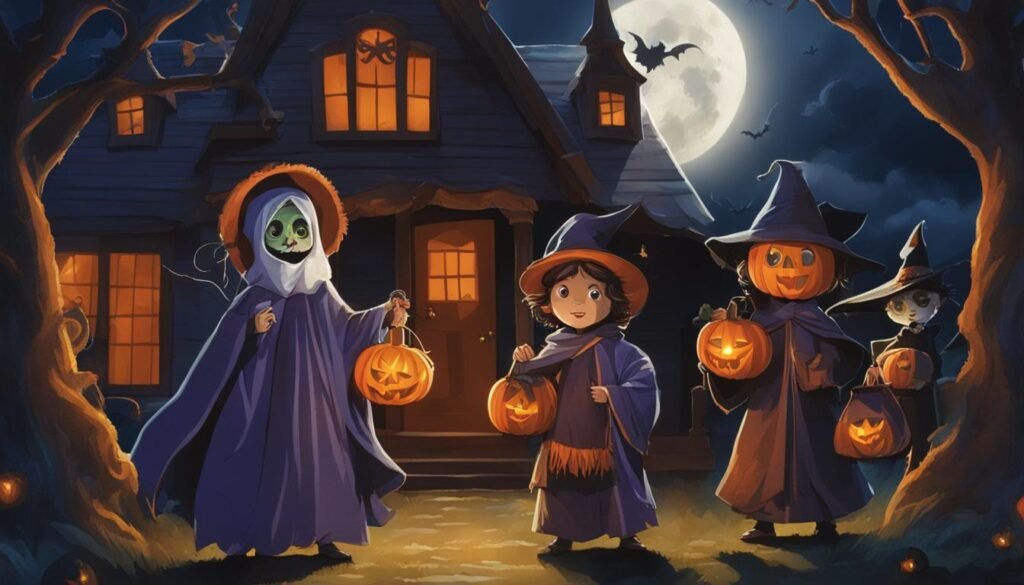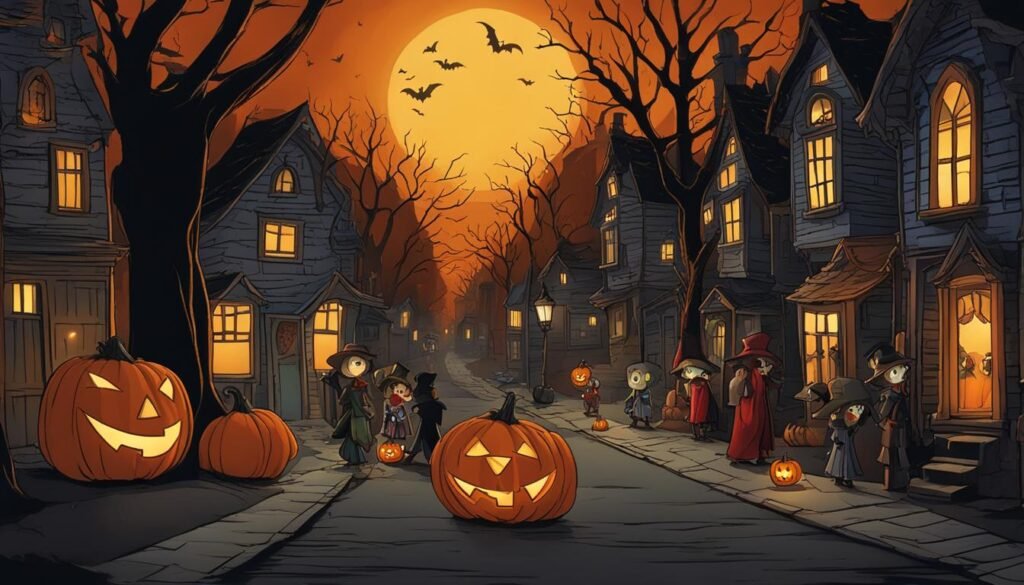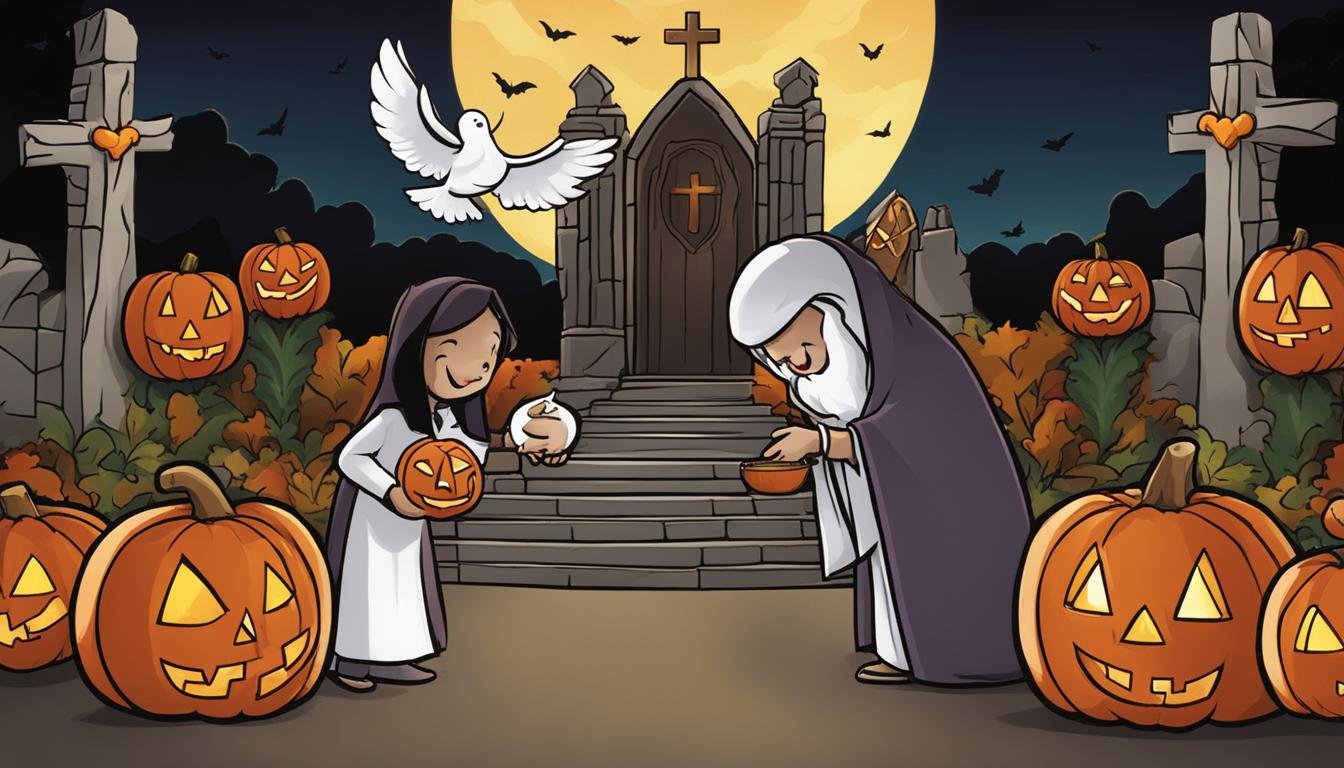Trick or treating is a popular Halloween tradition where children dress up in costumes and go door to door asking for treats. But what is the meaning behind this age-old practice in the context of the Bible?
Some believe that the phrase “trick or treat” originated from the medieval practice of “souling,” where people would go door to door asking for food or money in exchange for prayers for the dead. In a biblical context, trick or treating can be seen as a symbolic representation of the spiritual battle between good and evil.
Key Takeaways:
- Trick or treating is a Halloween tradition where children go door to door asking for treats.
- The phrase “trick or treat” originated from the medieval practice of “souling.”
- In a biblical context, trick or treating represents the battle between good and evil.
- It is important for each family to prayerfully consider their own convictions and how they can best honor God while engaging with this holiday.
- Trick or treating can be an opportunity to engage with the community and be a light for Christ.
The Historical Context of Trick or Treating

The tradition of trick or treating has a rich historical background, deeply rooted in Celtic and European customs. It originated from a practice known as “guising,” which was prevalent in Scotland and Ireland. The term “guising” refers to the act of dressing up in costumes and going from house to house, asking for food or coins.
This custom was brought to North America by Scottish and Irish immigrants in the 19th century, where it eventually evolved into the modern tradition of trick or treating. The first documented reference to trick or treating in North America dates back to 1911 in Kingston, Ontario.
These early Halloween customs became popular as communities embraced the festive spirit of the holiday. Children, adorned in costumes, would go door to door, eagerly seeking treats from their neighbors. Over time, the practice of trick or treating has become a beloved Halloween tradition, spreading across the United States and worldwide.
The Origins of Guising
In Scotland and Ireland, the tradition of guising was deeply ingrained in the Celtic Samhain festival. Samhain marked the end of the harvest season and the beginning of winter. During this time, it was believed that the boundaries between the living and the dead were blurred, and spirits roamed the earth.
“Guisers” would disguise themselves in costumes and masks, imitating these wandering spirits in an effort to ward off evil. They would go from house to house, performing songs, dances, or reciting poems in exchange for food, money, or other offerings.
These customs were carried over to North America by immigrants, who adapted them to fit the evolving Halloween traditions. As the years passed, the focus shifted from warding off spirits to the innocent fun of dressing up and collecting treats.
Halloween Today
Today, trick or treating has become a beloved part of Halloween celebrations, bringing joy to children and communities alike. It provides an opportunity for neighbors to connect, share in the festive spirit, and create lasting memories.
While the origins of trick or treating may have faded into the past, the tradition continues to evolve, reflecting the diverse cultural influences and creative costumes of the present day. As we participate in this time-honored practice, let us remember and appreciate the historical significance behind the door-to-door quest for treats.
The Biblical Perspective on Trick or Treating

From a biblical perspective, trick or treating can be seen as a symbolic representation of the spiritual battle between darkness and light. The Bible teaches us to turn away from evil and do good. In Ephesians 5:8, it says, “For you were once darkness, but now you are light in the Lord. Live as children of light.” This verse emphasizes the importance of being a light in this world, shining the truth and love of Christ.
While Halloween has pagan and occult associations, many Christians choose to use this holiday as an opportunity to be a witness and share the message of Jesus Christ. As 1 Peter 2:9 states, “But you are a chosen people, a royal priesthood, a holy nation, God’s special possession, that you may declare the praises of him who called you out of darkness into his wonderful light.
Being a light in the context of trick or treating means demonstrating Christ’s love and grace to others. It means using this occasion to engage with our community, show kindness, and share the good news of salvation. It is an opportunity to be intentional in our actions and conversations, pointing people towards the hope and redemption found in Jesus Christ.
Biblical Verses on Darkness and Light
“The light shines in the darkness, and the darkness has not overcome it.” – John 1:5
“For God, who said, ‘Let light shine out of darkness,’ made his light shine in our hearts to give us the light of the knowledge of God’s glory displayed in the face of Christ.” – 2 Corinthians 4:6
Do everything without grumbling or arguing, so that you may become blameless and pure, ‘children of God without fault in a warped and crooked generation.’ Then you will shine among them like stars in the sky.” – Philippians 2:14-15
Ways to Be a Light While Trick or Treating
- Show kindness: Remember to say “thank you” and show gratitude for the treats received.
- Include a positive message: Consider attaching a small note or Bible verse to the treats you distribute.
- Invite conversation: Be open to engaging with others and sharing your faith if the opportunity arises.
- Pray: Take time to pray for the families and homes you visit, asking for God’s blessing and guidance.
While trick or treating can be a personal decision for each family, it is crucial to approach it prayerfully and with a heart to honor God. The biblical perspective on trick or treating reminds us of our calling to be a light in the world and to use every opportunity to share the love and message of Jesus Christ.
Conclusion
The interpretation of what trick or treating means in the Bible varies among Christians. Some view Halloween as having pagan origins and choose to seek alternative ways to celebrate their faith during this time. However, others see Halloween as an opportunity to engage with their community and promote Jesus Christ.
Ultimately, the decision to participate in trick or treating or not should be guided by each individual’s Christian faith and personal convictions. It is important to prayerfully consider how best to honor God while navigating the traditions and celebrations surrounding Halloween.
For those who choose to participate, being a light for Christ in the midst of darkness is essential. This can be done by displaying kindness, love, and generosity while interacting with neighbors and friends during trick or treating. It is an opportunity to demonstrate the love of Jesus and share the good news with others, even in a secular holiday setting.
Each family must determine their own approach to Halloween, considering their Christian faith and values. Whether it involves alternative celebrations or active participation in trick or treating, the aim should be to promote Jesus Christ and make a positive impact in the lives of others.
FAQ
What is the origin of trick or treating?
Trick or treating has its roots in Celtic and European customs, particularly in Scotland and Ireland. The tradition of “guising” involved children dressing up in costumes and going from house to house asking for food or coins.
When did trick or treating start in North America?
The first known reference to trick or treating in North America was in 1911 in Kingston, Ontario. Scottish and Irish immigrants brought the tradition to North America in the 19th century.
Does trick or treating have a spiritual or biblical meaning?
Yes, there is a spiritual and biblical meaning behind the tradition of trick or treating. Some believe that the phrase “trick or treat” originated from the medieval practice of “souling,” where people would go door to door asking for food or money in exchange for prayers for the dead. In a biblical context, trick or treating can symbolize the spiritual battle between good and evil.
How do Christians view trick or treating?
Christians have different perspectives on trick or treating. Some choose not to participate due to its pagan and occult associations. Others see it as an opportunity to be a witness and shine the light of Christ in their community. Each family should prayerfully consider their convictions and how they can best honor God while engaging with this holiday.
Should Christians participate in trick or treating?
The decision to participate in trick or treating or not should be guided by prayer and seeking God’s wisdom. It is important for each family to determine how they can best live out their Christian faith and honor God in all aspects of life, including holidays like Halloween.

I’m Benjamin, a passionate spiritual seeker and creator of Verses and Prayers. Alongside my girlfriend Emma and our pet lizard Mulle, I cherish family life, enjoy exploring new places, and am deeply involved in my church community. My love for reading and singing biblical verses inspires every aspect of my journey.

